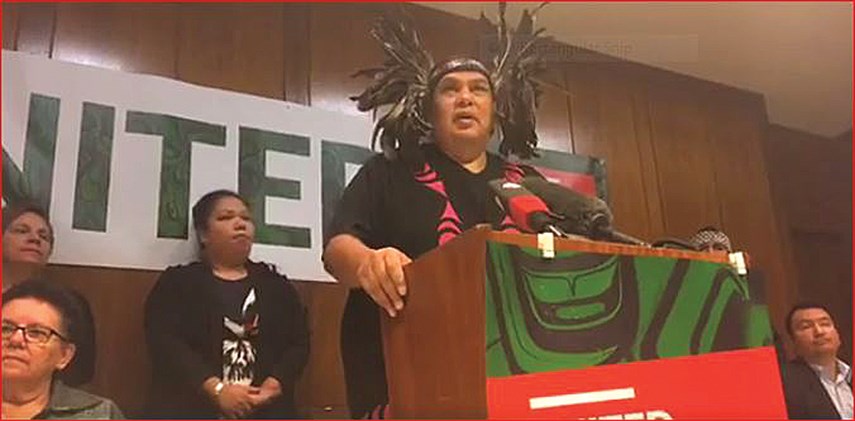Lawyers for the Tsleil-Waututh Nation appeared in federal court Monday to make arguments that the federal government failed to properly consult with them in approving the Trans Mountain pipeline expansion.
The Tsleil-Waututh legal arguments were the opening salvo of a two-week federal court hearing in which seven First Nations are challenging the process by which Ottawa approved the expansion of the pipeline which ships oil from Alberta’s oil sands for export via Burnaby’s Westridge marine terminal on Burrard Inlet.
Lawyers for the Squamish Nation are also expected to present arguments in court this week.
The province of B.C., cities of Vancouver and Burnaby and environmental groups seeking to overturn the project will also have a say in court, as interveners in the case.
In an emotional press conference prior to the court hearing, Tsleil-Waututh Chief Maureen Thomas said her nation was forced to take the government to court because “we feel we’ve been totally, totally not heard,” she said. “We had no other option.”
Lawyers for the Tsleil-Waututh told the appeal court Monday that there had been no meaningful consultation with the First Nation.
While cabinet was assuring Thomas – who travelled to Ottawa last November – that detailed submissions from the First Nation would be considered in the decision, Ottawa was already putting together a website announcing the project approval, said lawyers on Monday.
Eugene Fung, a lawyer for West Coast Environmental Law who has worked with the Tsleil-Waututh on the pipeline issue, said outside of the court that given the promise to consider the detailed material came just one day before the decision was announced, it’s clear meaningful consultation didn’t happen.
Tsleil-Waututh lawyers also argued in court that the National Energy Board erred when it refused to consider the pipeline’s possible impact on tanker traffic and marine safety in Burrard Inlet.
Chief Ian Campbell of the Squamish Nation said at the press conference Monday his people share concerns about tanker traffic, potential impacts on southern resident killer whales and salmon habitat.
“That is not the future that we see for our grandchildren,” he said. “We have a duty to step forward and hold the government accountable.”
Campbell said during the National Energy Board process, the Squamish repeatedly asked for specific information, including how diluted bitumen reacts in ocean water in the event of a spill, but received only “generalities” in response.
When the original pipeline was first built 60 years ago “we had no legal recourse,” said Campbell. “That era has come and gone in this country. First Nations are going to use every legal remedy possible to challenge and to stand up for the rights of our grandchildren and the rights of the environment.”
Fung said recent superior court decisions have clarified the duty owed to First Nations when government decisions affect their interests. “The best interests of the First Nation has to be kept in mind,” he said, adding consultation means more than simply listening to concerns. “You have to be able to respond to what you’re hearing.”
The province is also expected to weigh in by questioning how Ottawa chose to interpret the “national interest,” arguing that B.C. bears a disproportionate share of the risk in the pipeline project.
Environmental groups have focused their concerns on the risks to populations of southern resident killer whales through noise created by tanker traffic.
Kinder Morgan provided a statement saying the company will be “providing our legal argument through the court process and are confident in that process and our position.”
Legal arguments in the case are expected to continue for two weeks.



